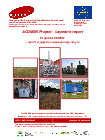ACUMEN: Assessing, Capturing and Utilising Methane from Expired and Non-operational landfills
ACUMEN was an EU LIFE+ funded project which demonstrated new approaches for using, and mitigating the climate change impacts, of the methane in landfill gas generated at older closed landfills.
About ACUMEN
ACUMEN was a demonstration project led by the Environment Agency. The project demonstrated new options for utilising and managing landfill gas from closed landfills. The project started in September 2012 and finished in August 2015. The Layman’s report provides a summary of the project.
Who was involved
The ACUMEN project was led by the Environment Agency with these partners:
- Norfolk County Council
- Biogas Technology Ltd
- Ground Gas Solutions Ltd
- Warsaw University of Technology
The project also received funding from:
ACUMEN was part funded by the EU LIFE+ fund. LIFE is the European Union’s (EU) financial instrument supporting environmental and nature conservation projects throughout the EU.
Why ACUMEN focused on closed landfills
When biodegradable waste is deposited in landfills, it decomposes releasing large quantities of landfill gas which contains methane and carbon dioxide. While modern landfills typically collect this gas and use it for electricity generation, many older landfills either flare this gas or release it directly to atmosphere. Methane is a highly potent greenhouse gas making landfills a significant source of greenhouse gas emissions nationally (approximately 4% of all UK emissions). ACUMEN demonstrated the possibility for older closed landfills to use their gas for electricity generation wherever possible, and to mitigate the climate change impact of the gas where power generation is not possible.
Project objectives
The ACUMEN project aimed to:
- develop a range of tools to help landfill owners identify which sites are most likely to be able to support an energy generation scheme
- use new and existing monitoring techniques to understand landfill gas behaviour, and it’s contribution to climate change
- demonstrate new techniques and technologies for utilising and mitigating the methane in landfill gas
- assess the costs and benefits of different options for utilising and mitigating landfill gas at older closed sites
- communicate our findings to landfill operators and other interested parties throughout the EU
Important findings
During the 3 year project, ACUMEN demonstrated a range of innovative technologies on 5 closed UK landfills. These demonstration sites yielded these important findings:
- small scale power generation can be viable at older closed landfills using 150 kilowatt spark ignition engines – the ACUMEN example generated revenues of approximately £50,000 per year (2015 prices) from landfill gas flows of 86 cubic metres per hour with methane concentrations of 40%
- micro-scale heat and power generation can be viable at smaller closed landfills using 8 kilowatt ‘Stirling’ engines – the ACUMEN example generated revenues of approximately £9,000 per year (2015 prices) from landfill gas flows of 25 cubic metres per hour with methane concentrations of 32%
- flaring of very low quality landfill gas is possible using low calorific value flares which can combust landfill gases with methane concentrations of as little as 8% without support fuel – the innovative low calorific flare developed during ACUMEN resulted in cost savings of approximately £9,000 per year through on-site efficiencies
- bio-oxidation techniques can successfully mitigate the methane in very low quality landfill gases – while these techniques don’t offer direct cost savings, they do provide a means to reduce the climate change impact of closed landfills in their very oldest phases
For more information on the ACUMEN project, and to access the project tools, see the University of Southampton’s LANDSS website.

